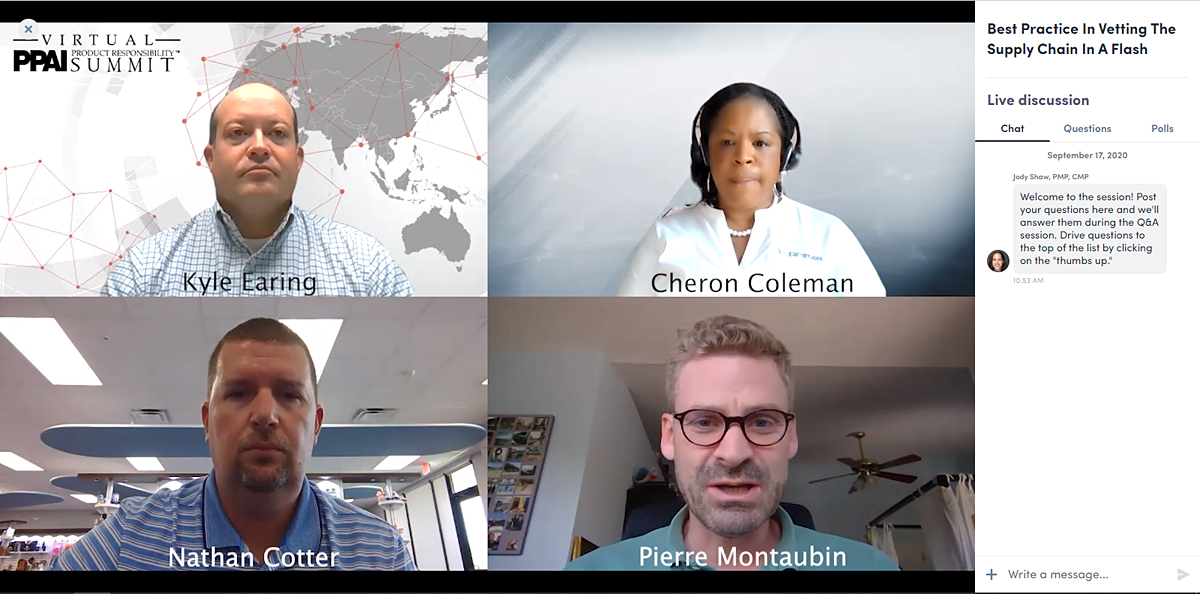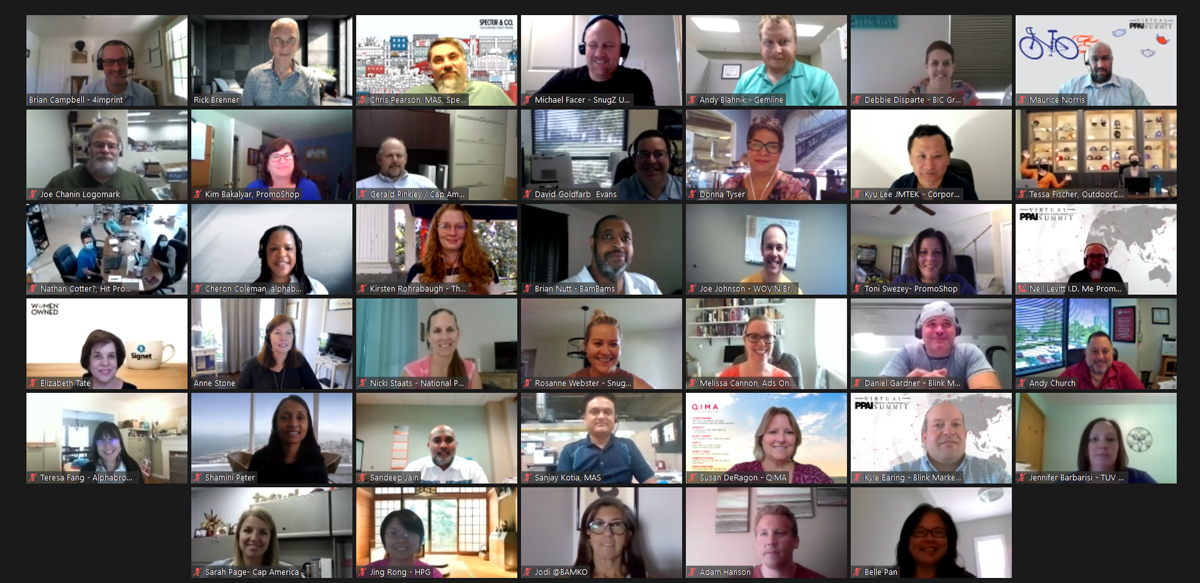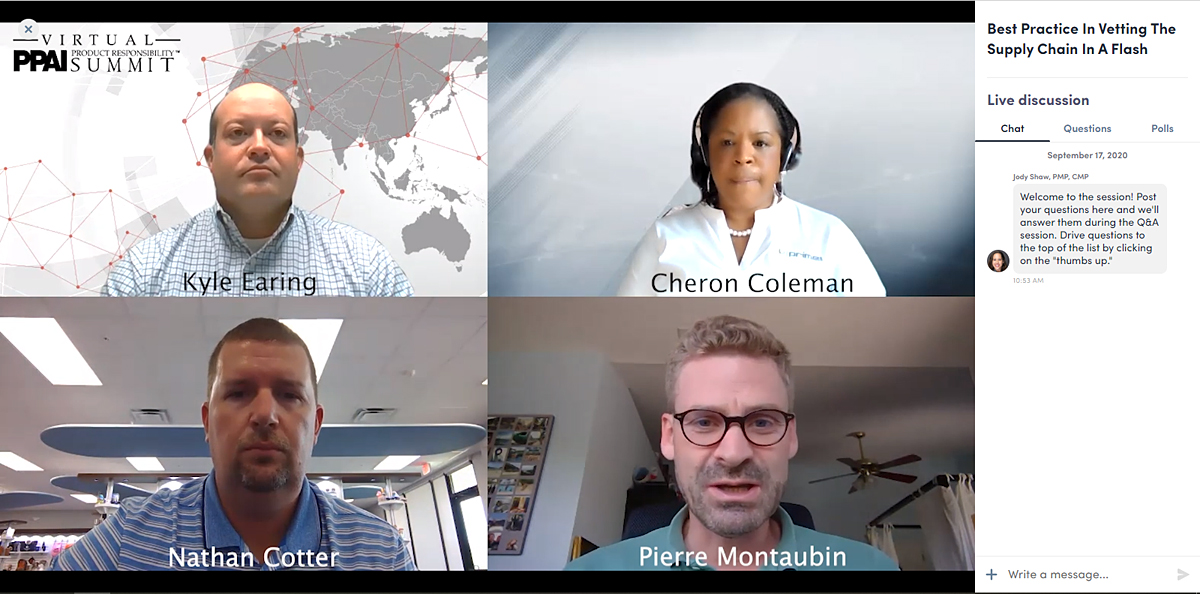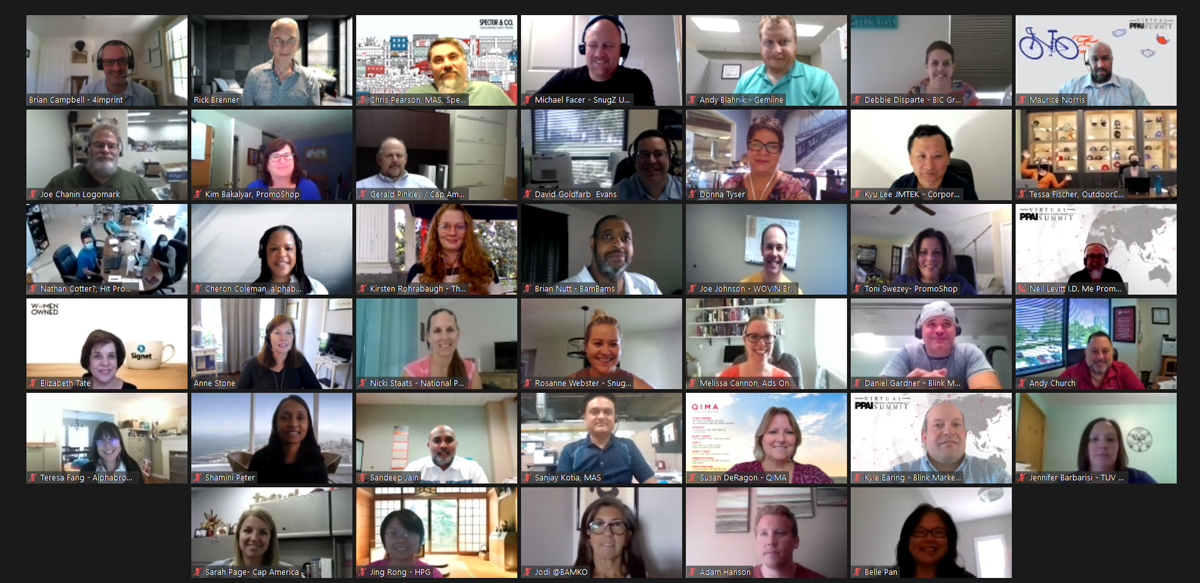This Year’s Summit Tackled Major Issues, Drew Positive Feedback From Attendees
PPAI’s Virtual Product Responsibility Summit wrapped up on Friday afternoon, concluding a full week of programming that explored the industry’s most relevant and pressing topics relating to product compliance. This year’s conference marked the 10th anniversary of this popular event.
Among the sessions on Thursday was “Human Rights And Forced Labor In The Supply Chain.” Moderated by PPAI’s Anne Stone, CAE, it included experts Nury Turkel, United States commissioner on international religious freedom, and Sharon Waxman, CEO of Fair Labor Association, who guided attendees through the far-reaching impact of forced labor, from the Xinjiang region of China, which is responsible for 85 percent of China’s cotton production. Apparel is the largest product category for the promotional products industry, and in this 60-minute session attendees sought to answer an important ethical question: Can you say for certain that there is no forced labor in your supply chain?
For decades, the Chinese government has persecuted the Uyghur people, predominately Muslim and Turkish people residing in the Xinjiang region of China, a place the Uyghur call East Turkistan. “What we are seeing today is nothing new,” said Turkel. The Uyghur region is about four times the size of California, and according to the Chinese state official figure, this region is home to about 11 to 12 million Uyghur although the real number is believed to be higher. Since summer 2017, the Chinese government has detained millions of Uyghur and other Turkish-Muslims. “Former detainees report that they suffered rape, torture and other abuses,” said Turkel. Nearly half-a-million Uyghur children have been separated from their families and placed in state-run orphanages where they are forced to praise the communist party and speak Mandarin. Forced sterilization of Uyghur women led to birth rates plummeting by 24 percent last year. Under international law, the activity in this region could lead to genocide.
The Chinese government has severely cracked down on other religious groups that could pose a political threat, forcing them to assimilate and destroying places of worship. “As the United States government has publicly stated, the Chinese government uses forced labor and religious persecution to achieve greater political objectives,” said Turkel. The Chinese government intends to centralize apparel companies in the region with a 2023 goal of locating one million textile and garment workers there.
In the first session on Friday, “Best Practices In Vetting The Supply Chain In A Flash,” three promotional products professionals discussed vetting and managing the supply chain during a rapidly evolving situation or emergency—specifically COVID-19 and the growing demand for PPE products—and the transitions that occurred in their respective businesses. Panelists Cheron Coleman, vice president of product development and global supply for alphabroder; Pierre Montaubin, vice president of product management and sourcing for BIC Graphic NA and Kyle Earing, vice president of quality and operations for Blink Marketing, Inc., told moderator Nathan Cotter, vice president of compliance for Hit Promotional Products, that the most effective decision they all made was to stick to the processes they already had in place prior to the start of the pandemic.
When asked about what helped them and their businesses navigate through the pandemic, Montaubin said, “Just rely on your team and rely on the people you do business with every day … [we work] very heavily [with] China and Asia, and we have vetted the supply chain for many years, so in getting those people on board and helping you find the right products for those uncharted times was, to me, one of the most important things.”
All three agreed that one of the major differences they experienced during COVID-19 was the rushed timeline. In order to meet the demand, they needed to produce the products or make them available immediately, but this came with a heightened focus on production that simultaneously met all compliance regulations. “From a compliance perspective, you’re always a killjoy in some ways to the salesforce, but you have to stick around because at the end of the day, you’re doing what is right for the company and the sale,” said Coleman, in discussing the importance of product compliance and safety.
In Summit’s final session on Friday, “Where Do We Spend First As We Rebuild And What Are Our Priorities,” panelists shared how they’re planning with confidence and addressing concerns related to product responsibility in the age of COVID-19. Kim Bakalyar, CAS, chief compliance officer at PromoShop, moderated this interactive session with speakers Sandeep Jain, vice president of supply chains at ImagenBrands; Cindy Belloso, global compliance manager at Sunscope; Donna Tyser, director of sales at Alight Promos and Lenny Polakoff, partner at Zagwear.
As businesses begin to rebuild, panelists said they are continuing to make testing for compliance a priority, delivering safe and compliant products. Jain, Tyser and Belloso agreed that spending money and time to get more “boots on the ground” overseas to ensure compliance is critical. Looking to source outside of China, the speakers acknowledged the difficulty of finding new trusted suppliers at appealing prices. But with forced labor infiltrating the supply chain, they agreed that more stringent efforts to move production out of China are taking place.
Summit drew 140 registrants and, for the first time, was delivered virtually. Several of the participants were eager to weigh in on their experiences.
“This year’s program was extremely valuable for many reasons,” says Kimberly Fulford, MAS, PPE product manager at Proforma. “One, staying informed and connected in our industry is critical and this event provided that forum. Second, PPE is still very new for many distributors and there is a lot to know and understand. I found the FDA session extremely valuable to me so that I can continue to help Proforma owners understand best practices for identifying qualified products and being alert to fraudulent or inferior PPE products.”
Long-time participant Rosann Webster, chief information officer at SnugZ USA, says, “Wow, this year’s conference has been phenomenal. I feel that PPAI and the PRAG [Product Responsibility Action Group] team did such a great job putting this virtual conference together. All of the sessions were relevant, well thought out, had wonderful speakers and I loved the Q&A format that followed each session. As a speaker on one of the panels, I am grateful that the PPAI team took the extra time to pre-record the sessions prior to the event.” She adds that she’s happy that the platform will remain in place for registrants for a few months. “There are a few sessions that I will go back and watch again. They’ve attached so many resources to the sessions in the platform that are so helpful.”
Janie Gaunce, president and CEO of Grapevine Designs, LLC, was impressed with the format as well as content. “From a technical perspective, it was interesting to move between pre-recorded and live Zoom content. It was so flawlessly produced that it made no difference from a user perspective. I jumped easily between the agenda and actual sessions. The Q&A and chat features were great—those questions from audience were so valuable. This information is ‘must have’ for our industry—especially this year—and I will try my darndest to never miss Summit.”
Lindsey Davis, MAS, director of promotional sales at Raining Rose, says she found this year’s program especially relevant. “As always, it focused on current compliance trends along with bigger issues and important trainings—I really appreciate that balance. There isn’t a lot of good created by the pandemic, but due to the virtual nature of the conference, we sent more people from our Quality and Compliance team and a couple were first-timers. It was a great experience to see them asking great questions about our industry and engaging on the topics where they have expertise.”





